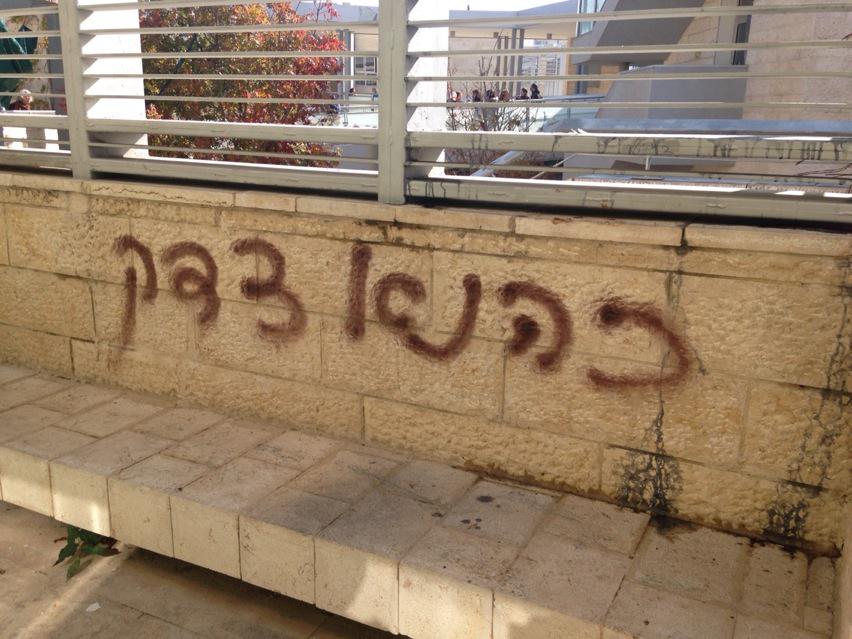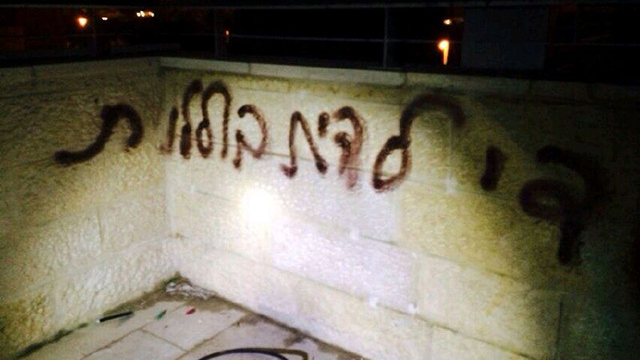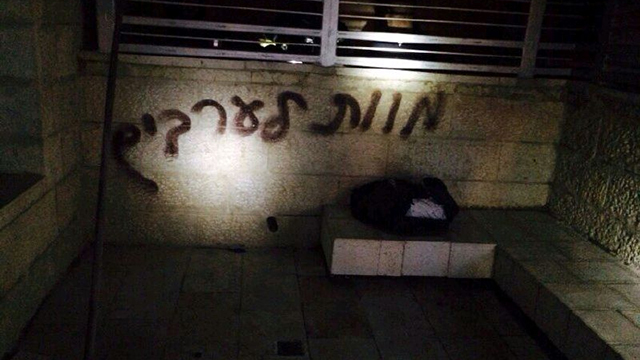Jewish horde continues hate-rampage in Jerusalem
Reports of the school arson attack from IBT and Ynet news; an encouraging report from +972 on those who turned out in support of the children and the school’s ideals.

Tweeted by William Booth (Washington Post correspondent), @BoothWilliam: ‘graffiti sprayed by vandals at only Arab-Hebrew bilingual school in jerusalem. “Death to Arabs” “cancer” “kahane” etc
8:48 AM – 30 Nov 2014’
Jerusalem Jewish-Arab School Torched in Suspected Hate Crime
Max Rayne Hand-in-Hand school set on fire and racist graffiti sprayed on its walls
By Gianluca Mezzofiore, International Business Times
November 30, 2014
Jerusalem’s Hebrew-Arabic bilingual school, which teaches more than 1,000 Arab and Jewish pupils from across the city, was allegedly set on fire in a suspected hate crime attack.
A preliminary police investigation uncovered signs that the fire was set intentionally from inside the school. Hebrew graffiti reading “Kahane was right”, “Death to Arabs” and “There’s no co-existing with cancer” were also sprayed on the building’s walls.
Meir Kahane was a far-right rabbi, founder of the Jewish Defense League (JDL) in the US.
Founded in 1998, the Max Rayne Hand-in-Hand Jerusalem School is the country’s largest Jewish-Arab institution, offering classes from pre-kindergarten to 12th grade (3 to 18-years-old).
As communal tensions increased between far-right Israelis and Palestinians in Jerusalem in the past months, the school was repeatedly targeted by Jewish hardliners, who defaced the school with racist graffiti against Arabs on its walls.
Jerusalem Mayor Nir Barkat condemned the attack saying that “pyromaniacs and those who disturb order cannot take the law into their own hand to disrupt the routine of our lives”. Firefighters quickly brought the fire under control.
Hand-in-Hand executive director Shuli Dichter said: “Even if they manage to dirty the school’s walls, they will not manage to bring down our enterprise.
“In addition to denouncing [these actions] expressing support, we invite the entire Israeli public to join us in the building of Jewish-Arab civil partnership in Israel,” Dichter continued. “We will continue to develop our educational and social project, where every day 1,200 students come to study, some 200 teachers come to teach, and in which thousands of family members are involved.”
Left-wing Meretz party called the incident a “direct result of the nation-state bill that gives legitimacy to damaging the fabric of relations between Jews and Arabs”.
The controversial Jewish state bill, which defines Israel as the “nation-state of the Jewish people” and is being discussed in the Knesset, has been strongly sponsored by Israeli prime minister Netanyahu, who said it is key to protecting Israel’s identity against its enemies. But critics accuse Netanyahu of pandering to the hardcore nationalists in his coalition and argue that the legislation will make the Israeli state less democratic and more racist.
The Israeli-Arab Balad party called the arson attack “an act of terror” and accused Israeli authorities of failing to hold accountable right-wing Jewish extremists for the so-called “price-tag attacks”.
“Price-tag” is a term used by Jewish settlers to describe attacks – usually carried out against Palestinians but also targeting Christian churches and Israeli Arabs – in retribution or punishment for the Israeli government’s actions perceived as pro-Palestinian.
The attacks are aimed at exacting “a price” for government actions, such as demolishing settlements.
Rioting became a daily occurrence in Jerusalem since the brutal killing of a Palestinian teen in July. The burnt body of Mohammed Abu Khdeir, 16, was found in a Jerusalem wood, allegedly in retaliation against the kidnapping and killing of three Israeli teenagers on the West Bank.
Religious tensions in Jerusalem have been reignited over a row over its holiest site, the Haram al-Sharif (The Noble Sanctuary) compound, known to Jews as Temple Mount.
A convicted members of the Islamic Jihad shot and wounded Yehuda Glick, a far-right settler rabbi who lobbied for greater Jewish access to Temple Mount. Glick was shot as he was leaving a conference at the Menachem Begin Heritage Center on lifting the ban on Jewish prayer at the hilltop compound.
In the latest attack, two Palestinian cousins stormed a synagogue in the ultra-Orthodox Har Nof neighbourhood slaughtering worshippers with a gun and an axe. Four Israelis were killed, six wounded.
Shuli Dichter, director of Hand in Hand, an Israeli organization that founded five bilingual schools in Israel, including the school in Jerusalem, said in response: “This is not the first act of harassment against the school and our establishment of civil partnership. Even if they manage to dirty the walls, they won’t be able to destroy our project.”
“In addition to a harsh condemnation and calls of support, we invite all of the Israeli public to join us in building civil partnership between Arabs and Jews in Israel. We will continue to develop our educational and social establishment in which 1,200 students learn every day, along with 200 teachers and thousands of family members of students who are involved,” Dichter added.
Hatem Matar, chairperson of the school’s Parent’s Committee said that in contrast to previous incidents, this time the arson was carried out within the school’s premises, and caused the burning down of an entire first grade classroom.
“This act of arson was carried out by abominable creatures. We will open the school as usual tomorrow; we already arranged an alternative classroom. We will explain to the children what happened, come to school and support them. This incident can only benefit for the good, because every time people try to drag us down to negative places, we only grow stronger,” Matar added.
Education Minister Shai Piron said that incident was a “violent, criminal and despicable act that could harm and undermine the foundations of Israeli democracy. The fact that the arson took place in an educational institution that promotes coexistence constitutes a harsh blow to the fabric of relations between Jews and Arabs. The incident is particularly serious considering that the criminals chose to target the soft underbelly of Israeli society, in a preschool where innocent children learn.”
Piron called on the Israeli police to act immediately in order to “bring the despicable criminals to justice.”
Shahar Hay contributed to this report.
All photos of graffiti sprayed on walls of burnt class-room by Arik Abulof, Jerusalem Fire Brigade

No to assimilation

Kahane was right

Death to Arabs
Jewish-Arab school in J’lem torched in suspected arson
Firefighters contain fire that broke out in school in capital, later find anti-Arab slogans including ‘death to Arabs’ scrawled nearby.
By Noam (Dabul) Dvir, Ynet news
November 29, 2014
Firefighting teams were dispatched on Saturday to the Hebrew-Arab bilingual school in Jerusalem after a fire broke out in the building. The blaze was located in the premises of the preschool. After extinguishing the fire, the firefighters found anti-Arab slogans including “Death to Arabs”, “Kahane was right” and other phrases against Israeli-Arab coexistence nearby.
Firefighter Arik Abulof said that four firefighting teams arrived at the scene after receiving a report about a fire in the school building. “We spotted thick smoke inside the entire structure. After extinguishing the fire, (the firefighters) found graffiti outside a classroom.” Abulof said that the slogans included: “No to assimilation”, “There’s no coexisting with cancer”, and “Kahane was right.”
Shaanan Street, lead singer of popular Israeli hip hop band Hadag Nahash, whose children go to the school, expressed hope that “whoever did this act would be caught and pay for their actions.”
Shuli Dichter, director of Hand in Hand, an Israeli organization that founded five bilingual schools in Israel, including the school in Jerusalem, said in response: “This is not the first act of harassment against the school and our establishment of civil partnership. Even if they manage to dirty the walls, they won’t be able to destroy our project.”
“In addition to a harsh condemnation and calls of support, we invite all of the Israeli public to join us in building civil partnership between Arabs and Jews in Israel. We will continue to develop our educational and social establishment in which 1,200 students learn every day, along with 200 teachers and thousands of family members of students who are involved,” Dichter added.
Hatem Matar, chairperson of the school’s Parent’s Committee said that in contrast to previous incidents, this time the arson was carried out within the school’s premises, and caused the burning down of an entire first grade classroom.
“This act of arson was carried out by abominable creatures. We will open the school as usual tomorrow; we already arranged an alternative classroom. We will explain to the children what happened, come to school and support them. This incident can only benefit for the good, because every time people try to drag us down to negative places, we only grow stronger,” Matar added.
Education Minister Shai Piron said that incident was a “violent, criminal and despicable act that could harm and undermine the foundations of Israeli democracy. The fact that the arson took place in an educational institution that promotes coexistence constitutes a harsh blow to the fabric of relations between Jews and Arabs. The incident is particularly serious considering that the criminals chose to target the soft underbelly of Israeli society, in a preschool where innocent children learn.”
Piron called on the Israeli police to act immediately in order to “bring the despicable criminals to justice.”
Shahar Hay contributed to this report.

Supporters from anti-racism organization “Tag Meir” arrive to show support at the Jerusalem bilingual school that was the target of an arson attack the night before, November 30, 2014. Photo by Activestills.org
We will overcome’: Arson and mourning at Jerusalem’s bilingual school
The mixed Jewish-Arab school has been the target of racist attacks in the past, but for the parents, students and teachers of the ‘Hand in Hand’ school, this feels different. ‘This time, the fire was ignited inside our home.’
By Orly Noy, +972
November 30, 2014
Firefighters in a classroom that was set on fire in the bilingual Hand In Hand school in Jerusalem, November 29, 2014. (Photo by Tali Mayer/Activestills.org)
Firefighters in a classroom that was set on fire in the bilingual Hand In Hand school in Jerusalem, November 29, 2014. (Photo by Tali Mayer/Activestills.org)
The timing couldn’t have been more “perfect”: while I was still at a demonstration against the “Jewish Nation-State Law” outside the Prime Minister’s Office, I got a message saying that the bilingual school was set on fire. Here we were demonstrating against political arson, and not too far away someone is already doing it with gasoline and matches. This time, the fire was ignited inside our home.
The smell of fire is still very strong in the parking lot across from the school. Slowly slowly, parents, teachers, students and recent graduates begin to arrive. Nobody is in a hurry to go inside, as if we fear actually seeing what we expect there, all while we’re still trying to figure out exactly what happened and the extent of the damage. “A first grade classroom was completely burned,” somebody says, “and the other first-grade classroom sustained serious damage, too.” The blood drains from our faces. They burned the first-grade classrooms? The classrooms in which children for the first time in their lives scribbled letters into words: “love, friendship, respect?”
We later learn that the arsonists threw all of the books that they found in the classrooms into a pile and burned them. The image is too difficult to even fathom, and a part of me is relieved that firefighters and police have cordoned off the burned classrooms and aren’t letting anyone in. Who can rid such an image from their head — a burned first-grade classroom?

The burned first-grade classroom at Jerusalem’s bilingual school after it was the target of an arson attack, November 30, 2014. Photo by Activestills.org
Within an hour the school is bustling with people. Among the police officers, firefighters, people from the Jerusalem education bureau and other officials, are the rest of us: teachers, students and school staff. You can see the shock on our faces. I recognize a student who graduated last year and who lives on the other side of the city; I ask her what she’s doing here. “Since the Gaza war and everything that’s been happening in Jerusalem recently, I feel like I’m losing hope. I felt like everything that we built here over the past 12 years has been destroyed in two months. But anyway, the moment I heard that the school had been burned, I ran to come here. That’s something that never changes, it seems. This is home. I grew up here. They’re destroying my home. We fight over the land but this is my land. This school is my land.”
A stranger couldn’t understand it, the deep feeling of belonging. That’s how it always works here: when it gets tough, we want to be together. Jut like during the war when we marched along the light rail tracks every week, and when it was important to make sure that the sane voice of Jerusalem was heard, but also when we just wanted to be together. And also now, as we shake off the feelings of helplessness and get ready for action: preparing alternate classrooms for those that were burned, making colorful banners for the first graders to see when they arrive in the morning, hanging signs in the hallways, cleaning, organizing. Home.
As we get to work, we are reminded of other episodes in our history in which the school faced harassment: that time that they went into the lower classes and covered with glue all of the desks that bore names of Arab children; or in the school’s previous building when they slid burning pieces of paper under the doors in a more symbolic act of arson. All of the hateful and garbled graffiti sprayed on our walls over the years. And despite all that, we understand that this time it’s different. The children wander around with their parents looking especially worried. “Nadia, will there be school tomorrow?” a young student asks one of the school’s co-directors. “Of course there will be,” Nadia answers confidently with a big smile. “Not only will there be school but you need to finish your homework!”
Meanwhile, statements of condemnation and support start to come in, and they begin organizing various rallies in solidarity and support for the next day. We go home knowing that we will meet here again in just a few hours.
This morning, we understood that we better arrive early ahead of the tumult that would certainly await us at the entrance of the school. Indeed, hordes of reporters and photographers assembled at the entrance. A burned school is a big story, it seems. We manage to usher the children into the school, and we wait outside for the supporters who were supposed to arrive. Somebody mentions that it feels like a shiva (a Jewish mourning ritual), receiving mourners, awaiting consolation calls.
And they came. Throngs of them came. The wonderful people from anti-racism group Tag Meir arrived, students and representatives of some schools in the city also came, people from wider social circles, and other women and men who chose to spend their morning with us, in solidarity. An especially touching moment was when we saw a large group of youths chanting as they approached, and after our initial instincts — based on experience — made us shrink into a moment of fear, they got closer and we heard what they were chanting: “Jews and Arabs refuse to be enemies.” It turned out that the neighboring “Rainbow School” canceled its classes so its students could come and support us. It’s hard to describe just how touching it was.
And the politicians came too, of course: MKs Nahman Shai and Erel Margalit, Justice Minister Tzipi Livni and Jerusalem Mayor Nir Barkat, who condemned the crime and called to restore routine to the city.
I appreciate that Mayor Barkat came to visit the school — and I say that without any cynicism. It was the right thing to do and it was necessary. Once upon a time, during the weekly protests in Sheikh Jarrah, we used to say, “there’s nothing holy in an occupied city.” Today I want to tell Barkat: there isn’t anything routine in an occupied city. A routine of occupation and violence is a routine of iniquity. You can condemn the torching of a school as much as you want, but when 40 percent of the city’s residents under your jurisdiction live a daily war zone, there’s nothing routine about that. When the daily routine of over 350,000 people in the city you run is a routine of daylight robbery, of violent police raids, of sponge-tipped bullets and arrests, of “skunk” trucks that spray putrid water on homes and schools, that’s not a routine that we want to adopt. When the students in our school must leave their homes two hours before school in order to travel a distance that should take only 20 minutes because their neighborhood is barricaded and blocked with concrete blocks, when our students breath in tear gas in their homes each week and come to school from a daily war zone, we won’t join your calls to restore routine.
The routine in your city is one of iniquity, Mr. Barkat. Our school’s community is strong and vibrant. We demand, of course, that you and your leadership provide our students with protection from the increasing violence. But like always, we will be doing the repairs and rehabilitation by ourselves, with the power that comes from our moral high ground and from the civil and social solidarity we’ve built. We will overcome. You, Mr. Barkat, go see to the well being of the city you have been entrusted with managing. And if you need inspiration — moral, ethical or from the community — you are always welcome to come visit the bilingual school. We will keep going it alone here, free from fear and hatred.
